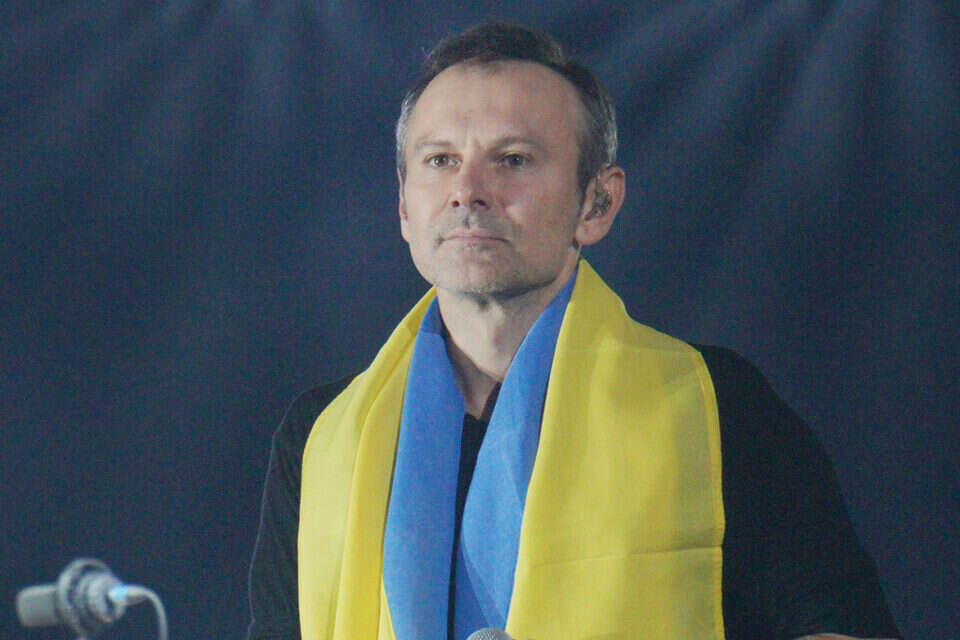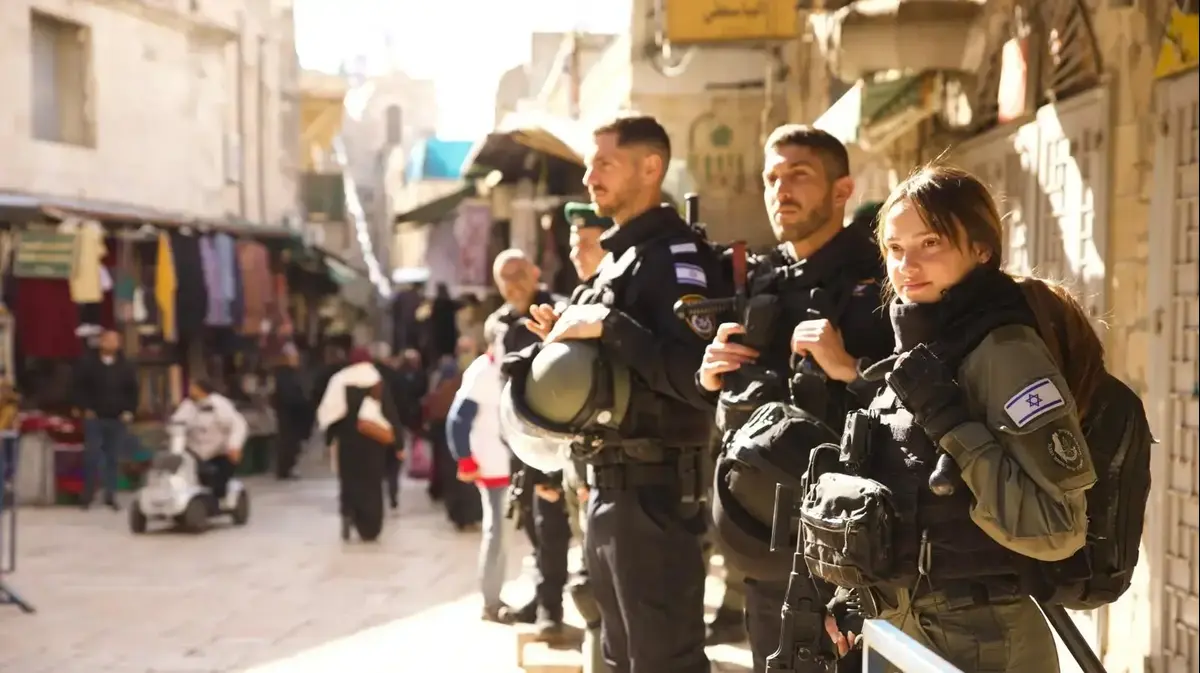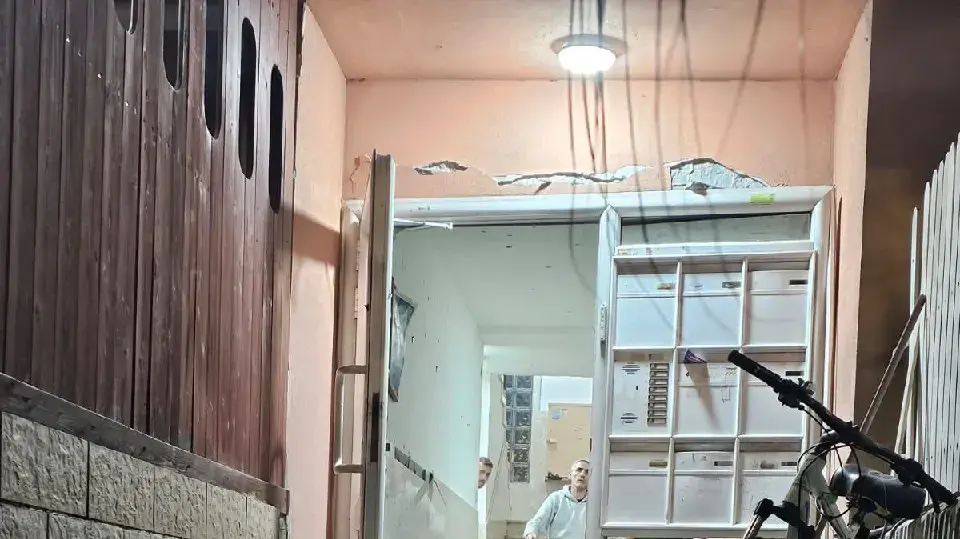His name is Svatoslav Vakarchuk, but in Ukraine everyone calls him Slava. He is a star in his country. It seems that at a certain moment, before Volodymyr Zelensky, he thought of running in the presidential elections. But even if he didn't run in the end, his fan base tried to do it for him, and he was forced to officially announce, a few months before the election, that he had not crossed the lines and that he remained true to his faith.
The only and exclusive passion of this person - who, among other things, is an educated person, a first-rate scientist, and who also served as a member of the Ukrainian parliament in the past - is undoubtedly music.
For those who don't know Vakarczuk, he may remind Sting or Bruce Springsteen: his image and voice are similar to those of these giants, who reborn Anglo-sex rock.
But luckily there are other people who know him.
There are those who heard him sing to the soldiers in the trenches in the Donbas region, while others saw him perform together with his band "Ocean Elzy" in front of the Brandenburg Gate in Berlin, and it seems that the history of Europe, the history of the European empires and their fall, of the acts of barbarism and the acts of liberation that took place within it, reacted to him in the same way Manner.
And there are also lucky people, like me, who discovered him in 2014, in the Maidan (short for "Midan Nezalzhnosti", or "Independence Square", the square became the symbol of the Orange Revolution - the translator) and met him again at the Zenit Club in Paris, a few days ago, when he performed the The song "Zelani Ochi" ("Green Eyes").
On the huge and festive stage, in front of a sweaty crowd dancing together, the accompanying musicians went wild in the smoke and blew their long hair and their guitars;
A pure rock spirit prevailed in the place, and Selva, with a stiff body and a sealed look, with a cracked and noble face, jumped bare-chested like a tiger on a raised platform, spread his arms to the sides, not like Jesus, but like the Vitruvian Man from Leonardo da Vinci's painting, and invited Everyone to applaud as forcefully and powerfully as him.
Trying to stay human
There are also those who will content themselves with watching the video uploaded to YouTube from the Venice Biennale.
In the courtyard of an ancient and crumbling reddish-brown building, you can see gravel, hanging wires, exposed iron bars, as if the place had been damaged by the bomb.
In the background, as a tribute to the spirit of the European cities that we believed were eternal, a wrought iron gate with delicate circles.
And Karchuk masters the creation of a perfect chorus that is the pinnacle of a song and a text, he masters this absolute and minimal art, which revolves around itself like a contradiction, an art that the spirit of the times, the spirit of youth or the spirit of the people clings to
In a "shot" from a low angle, one can see the sky glowing from clouds or from the flame of a fire - one does not know;
And in this setting of the end of the world, a pianist sits next to a Martita string quartet, and Vakarchuk's voice emerges, singing: "Obimi Mena... kiss me... kiss me again... don't leave my arms, kiss me... ".
Is it possible to sing about anything better than love when we are a nation trying to remain human under the onslaught of inhuman fury?
Is there anything other than a ballad that constantly revolves around a chorus as we seek protection against the hatred, against the missiles about to fall, and against the chaos?
In the eyes of all these people, and Karchuk is like no one else.
He is Slava and Slava only: one of the last epic rockers and poets of our time.
Because there are two types of poetry: the Orphean poetry and the lyric poetry.
Orpheic poetry is closed within itself;
This is arrogant poetry, difficult to understand at its peak - in French, we can think for example of the poet Stéphane Mallarmé.
On the other hand, lyrical poetry wants the approval of the other, big or small, its heart is as bare as the poet's heart, it deals with simple and deep feelings - "the people of the Rhineland" and "brothers of mankind, who live after us", i.e. the war poems of Guillaume Apollinaire or "ballad The Dependents" by François Vion.
But among this species of lyrical poets, there is a rarer animal: the lyrical and epic poet, or as the ancient Greeks called him the "Ed", and in modern France the "troubadour";
A poet who is a messenger without a mandate, who deals with and cares for the fate of a certain people through the mystery of his words, his voice, his body and his presence.
And that's exactly what Vakarchuk is doing for the Ukrainian people.
without nationalism
Like Louis Armstrong, with the help of his hoarse voice, turned the torture and revival of the American blacks into a nostalgic combination;
As Bono embraced, once and for all, with his hoarse harmonies, the bleeding corpse of his beloved Ireland.
Yes, like these two, and Karchuk brings the miracle of simplicity without losing anything in doing so - a miracle that is the poet's secret.
Like these two, and Karchuk masters the technique of genius sparseness, of mercilessly trimming the fat of the music, that is, with the splendor of textures belonging to rock and roll;
And Karchuk masters this celibacy, creating a perfect chorus that is the pinnacle of a song and a text, he masters this absolute and minimal art, which revolves around itself like a contradiction, an art that the spirit of the times, the spirit of youth or the spirit of the people clings to.
There is nothing nationalistic about this whole thing.
Just a body that jumps in a place that sweats, bleeds and kills.
Only a hoarse and delicate voice, between tenor and baritone, with a clear and stable sheath;
A voice that doesn't have time to hear itself because it always seems on the verge of breaking;
A granite voice that not only loves and cries but also screams, because its cry is the cry of a living country - and it itself insists on living.
And finally, it's only a poet who chose - even if it wasn't always the case, now it is - to sing in the language of the persecuted, the bombed and the tortured, and only in it.
Because of all these reasons, Slava is the soul of Ukraine.
Translated from French: Hod Halevi
were we wrong
We will fix it!
If you found an error in the article, we would appreciate it if you shared it with us













/cloudfront-eu-central-1.images.arcpublishing.com/prisa/KMEYMJKESBAZBE4MRBAM4TGHIQ.jpg)

